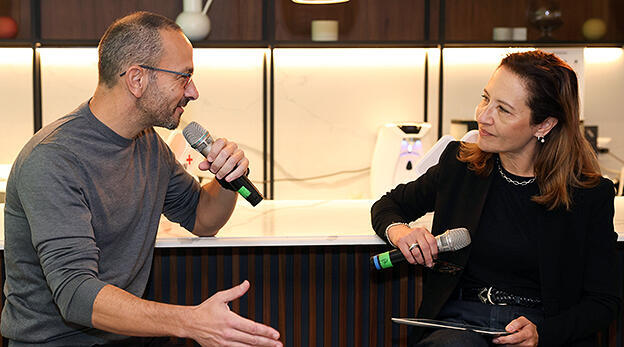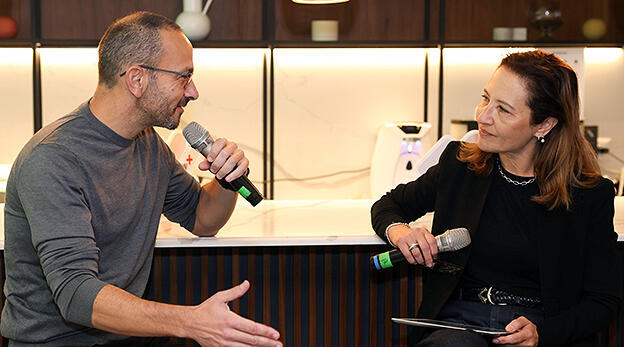
Gilad Yavetz: "A rocket hit on a major power station would have existential significance for Israel"
The CEO and Founder of energy giant Enlight spoke at Calcalist and Bank Hapoalim's Roadshow+ event about the need to decentralize Israel’s electricity grid, on societal divides, and on coping with the loss of his son, Captain Yiftah Yavetz, who fell in the battle of Nahal Oz on October 7th.
"Everyone copes with loss differently. Our way is to try to find the good. Evil has always existed and always will. The goal is simply to try to increase the light," said Gilad Yavetz, Founder and CEO of energy giant Enlight, whose son, Captain Yiftah Yavetz, fell in battle at Nahal Oz on October 7th.
Yavetz spoke during an interview with Calcalist editor-in-chief Galit Hemi at Calcalist and Bank Hapoalim’s RoadShow+ event at Expo Tel Aviv which brought together entrepreneurs and investors. Yavetz addressed, among other topics, the state of the electricity grid, the need to recruit haredi (ultra-Orthodox) men, and the impact of the new U.S. administration on renewable energy growth.
Prior to speaking, a film about Yavetz’s efforts to rehabilitate Nahal Oz was screened.
Gilad, on my way here, I thought about how throughout our lives, we carry various titles. Until just over a year ago, you were primarily Gilad Yavetz, Founder and CEO of Enlight. Then a new title was added - Yiftah’s father. What does that title mean to you?
"Maybe I'll tell a short story. The film you saw was screened for the Nahal Oz community on the anniversary of October 7th. When they mentioned me, I heard young people behind me say, 'That's Michal’s dad.' My daughter volunteered in agriculture at Nahal Oz, and I feel this circle of life. My son Yiftah went to Nahal Oz to save its people; I continue his efforts through the actions we're taking in Nahal Oz, and my daughter continues my work."
If we go back to life before October 7th, you didn’t hesitate to voice sharp criticism of the judicial overhaul and were very active on the issue. How does that connect to the immense loss you’ve suffered?
"There’s a clear line connecting these things. When we’re deeply concerned, it drives us to act. In the end, we’re high-tech people. What motivates us is finding solutions to problems. That’s what drove us before October 7th, and it’s what should drive us now."
Societal division seems even greater now than before the war broke out; the government is fighting to prevent the enlistment of haredi men, 101 hostages have been abandoned in Gaza. What makes you optimistic?
"Ultimately, we become better only when we collaborate. Our ability to work together, to find common ground, is what matters. I happened to hear a quote from the late Capt. Eitan Oster who said: "A true warrior does not fight because he hates what is in front of him, but because he loves what is behind him.
"I had a conversation with journalist Amit Segal before the war during the fight over the judicial overhaul. I told him that there’s no point in blaming each other. We need to understand what common ground we can live with. The issue of drafting haredi men has broad consensus; it’s something that crosses sectors in Israeli society and something we must build on. I’m confident this will be part of the next government’s agenda."
Let’s shift from existential security to energy security. What is the state of Israel’s electricity sector?
"The electricity sector is in a poor state. It's highly centralized, with ten stations generating over 50% of the country's electricity - something that would be unheard of elsewhere. This is very dangerous from a security perspective. The only way to fix it is decentralization. The current setup causes delays and high costs."
If, heaven forbid, a missile hits the power station in Hadera tomorrow, what would happen?
"It would be existential. Losing a large part of the generation capacity wouldn’t just mean sitting in the dark - it would paralyze gas stations and the grocery supply chain. This shouldn’t be viewed with panic but as a problem which requires a solution. The solution is decentralization and building new power stations. Instead of ten, there should be 300, making the grid resilient. Plus, the new stations would lower electricity costs since they’d be cheaper to build."
Why hasn’t this happened yet?
"This has been a governmental and public failure for 20 years, resulting in extreme delays. It stems from a weakened public sector, an ineffective government, and radical interest groups blocking planning processes for years. Together, this has left us lagging far behind the developed world in electricity and renewable energy."
How does a shaky economy and credit downgrades impact this?
"This is the solution, not the problem. Technology now allows electricity to be supplied faster and cheaper. The funding won’t come from the government. Our proposed solutions will be implemented in conflict zones - in the Western Negev and the north - helping communities rebuild and sustain themselves without relying on anyone’s charity."
The government has set renewable energy targets. How realistic are they?
"The target for 2030 is 30% renewable energy, compared to 50% in Europe. We’re currently at 13%. The chances of meeting these already modest targets are slim, but that’s not the point. The focus should be on creating solutions now. In the long term, it doesn’t matter where we are by 2030; renewable energy is inevitable. It’s cheaper, fosters competition, and has become the primary electricity source worldwide."
Enlight raised its forecasts for 2024, with the U.S. market as a key growth driver. Considering Trump’s election and his known skepticism toward renewable energy, are you adjusting your strategy?
"The global electricity demand is undergoing a massive revolution, with historic growth after 20 stagnant years. This is driven largely by AI data centers, which base their locations on electricity capacity rather than computing power. While this administration may not favor renewable energy, it doesn’t want to slow the economy either. The only way forward is building power stations. Even during Trump’s previous term, though the rhetoric was similar, the sector still boomed."















